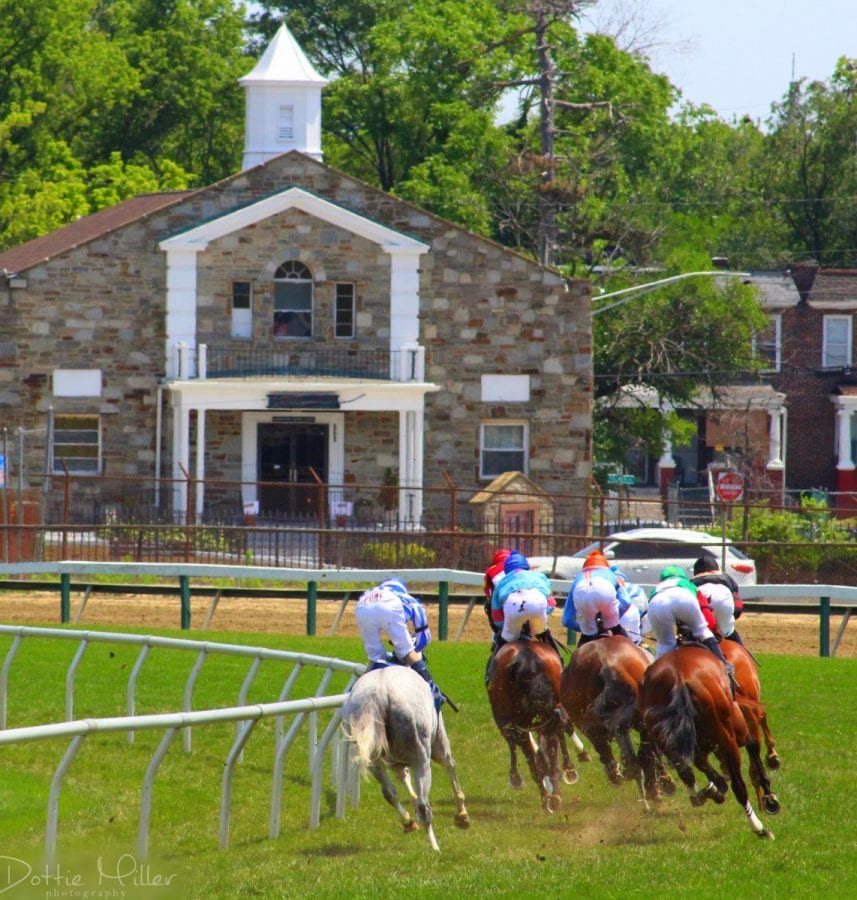Hearings done, now comes hard part on Pimlico, industry future

Horses round the clubhouse turn at Pimlico, with Manna Bible Baptist Church in the background. Photo by Dottie Miller.
The hearings are over. Now it’s time to make the sausage.
The Maryland Senate Committee on Budget and Taxation held a roughly three-hour hearing Wednesday afternoon in Annapolis, with the bulk of it dedicated to bills that would impact the racing industry.
And if the hearings looked and sounded quite a bit like Monday’s House Ways and Means hearing on the same topics, that’s no surprise. The Senate hearings brought together largely the same players with generally the same messages as did the earlier House hearings.
Now the heavy lifting starts; the burden shifts to the Legislature to decide whether to back one or the other horse, or to hit the all button.
Primarily at issue were two pieces of legislation. HB 1190/SB 800, introduced at the request of the Baltimore City administration, would create a study group tasked with determining ways to fund a new, $424 million Pimlico based on the proposal developed by the Maryland Stadium Authority late last year.
And HB 990/SB 883 would allow the Maryland Jockey Club (MJC) to work with the state-created Maryland Economic Development Corporation to issue bonds backed by Racetrack Facility Renewal Account (RFRA) funds to undertake major projects at Laurel Park and the Bowie Training Center.
In addition to pushing its bill, the City has taken a position in opposition to the MJC-backed legislation, calling it “premature” and suggesting that those RFRA funds be kept back because they might be needed for a Pimlico project.
The Stronach Group, for its part, has said it does not oppose the Pimlico study bill – but that studying the future of Pimlico should not stop or slow the company’s efforts to build a “super track” at Laurel and to renovate Bowie.
“Please do not allow this study bill to slow the tremendous progress” the MJC is making, Stronach Group chief operating officer Tim Ritvo asked legislators.
“We cannot study the racing industry out of existence,” agreed David Dunphy, a lobbyist for the United Food and Commercial Workers (UFCW) Local 27, which supports the MJC-promoted legislation and is pushing for an amendment to resolve what he called a “chronic shortfall in the track employees’ pension funds.”
But on the other side of the issue, it was Pimlico’s existence that took center stage.
“We must roll up our sleeves, get back to work, and make a new Pimlico a reality,” Baltimore Mayor Catherine Pugh (D) told committee members.
She added, “We should not be taking away something from a city that is one the rise.”
She, and a bevy of supporters who spoke on the city’s behalf, portrayed the Preakness as “Baltimore’s Super Bowl” and said that losing it would cause the city virtually irreparable emotional and economic harm.
“We simply cannot replace” the economic impact of the Preakness – estimated by the Maryland Department of Commerce in 2015 to have been nearly $34 million – said Baltimore Development Corporation President and CEO Bill Cole.
The Rev. Michael Gaines, executive pastor of Manna Bible Baptist Church located just across Belvedere Ave. from Old Hilltop, opined, “I really do believe that it would be a death certificate for Park Heights to remove this jewel from that area.”
And some advocates expressed doubt about the intentions of The Stronach Group.
“They may say, ‘We are building a future for Thoroughbred racing in Maryland,’” said racing fan April I. Smith, who co-administers the “Friends of PImlico” Facebook group. “But it is a future at the price of a great legacy that cannot be duplicated or reborn anywhere else.”
But racing industry representatives, presenting a united front, suggested those concerns were overblown and pushed back on suggestions that The Stronach Group had somehow misled the public or misspent public funds by putting the lion’s share of RFRA moneys into Laurel.
“This [study group] bill doesn’t keep the Preakness in Baltimore,” pointed out lobbyist Joe Bryce, who represents the Maryland Jockey Club. “And the [RFRA] bills you’ll hear about don’t take it away.”
“I’m much more comfortable defending how we spent the RFRA money than I would be had we done the reverse,” Bryce added, pointing out that had the company spent those funds at Pimlico, the facility would almost certainly still need to be demolished to move forward on that site.
Instead, industry representatives pushed for a two-prong approach: study how to resolve the future of Pimlico while continuing to move forward on a “super track” at Laurel Park and a so-called “world class training facility” at the former Bowie training center.
The Stronach Group “believes that prudent investment of public and private dollars is in a super-track at Laurel,” Ritvo told the Committee. Such a project would cost about $120 million, he estimated – less than one-third the amount required for a new Pimlico and not requiring any state investment beyond moneys already earmarked for racing facilities.
The battle lines are now drawn, and it is the Legislature that will determine what happens next. The path of least resistance would be to approve both bills, thus keeping the dream of Pimlico’s rebirth alive while allowing The Stronach Group to proceed on work it – and others in the industry — say is vital to the future of the Thoroughbred industry in Maryland.
If, however, the Legislature chooses a different course, passing one of bills but not the other, it will be a strong sign that legislative leaders have decided which horse they’re backing going forward.












